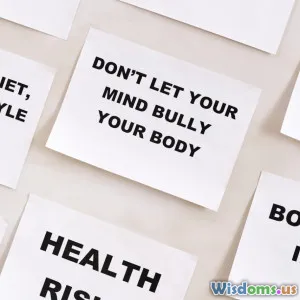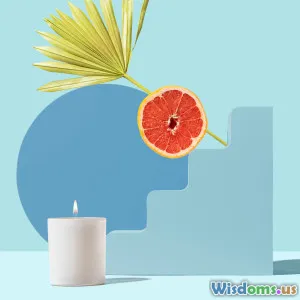
Surprising Benefits of Self Awareness You Never Knew
9 min read Discover hidden advantages of self-awareness that enhance your life, relationships, and career beyond typical expectations. (0 Reviews)
Surprising Benefits of Self Awareness You Never Knew
Imagine possessing a tool so powerful that it could improve your career, enrich your relationships, and sharpen your emotional resilience — all without requiring expensive courses or equipment. This tool is already within you: self-awareness. While many recognize self-awareness as a path to mindfulness or emotional regulation, its full range of benefits often remains underestimated. In this article, we’ll dive deep into the surprising, science-backed advantages of self-awareness that can transform your life in unexpected ways.
What is Self-Awareness?
Self-awareness is the ability to introspectively recognize and understand your own personality, emotions, thoughts, and behaviors. It’s like holding a mirror to your inner world — observing without judgment and acknowledging your traits and tendencies.
Dr. Tasha Eurich, an organizational psychologist, defines it succinctly as knowing “what you think and feel, and importantly, knowing how others see you.” This dual insight — looking inward and outward — sets self-awareness apart from simple self-reflection.
Unexpected Benefits of Self-Awareness
1. Enhanced Decision-Making Under Pressure
Most people associate strong decision-making with logic or expertise. However, self-awareness offers a surprising edge. Recognizing your emotional triggers and biases can prevent impulsive or emotion-driven choices.
For example, a 2012 study published in the Journal of Personality and Social Psychology found that individuals who were more self-aware made more deliberate decisions even under stress compared to those who lacked this awareness. This finding highlights that by monitoring internal emotional shifts, you can pause, reevaluate, and act more strategically.
Practical Tip: Next time you face a tough choice, take a moment to check in with your feelings. Are you reacting out of fear, pride, or impatience? This practice will steer you toward clearer thinking.
2. Increased Emotional Intelligence and Empathy
Emotional intelligence (EI) is crucial for healthy relationships and leadership. Its cornerstone is self-awareness. Understanding your emotions helps you read others’ feelings more accurately.
Research from the Yale Center for Emotional Intelligence reveals that individuals with high EI report stronger social connections and better conflict resolution skills. When you're aware of your emotional states, you can better regulate responses and, consequently, foster empathy.
Consider leaders like Oprah Winfrey, renowned for her empathetic communication style. Her self-awareness allows her to connect authentically with others, building trust and inspiring loyalty.
3. Boosted Psychological Resilience
Resilience is often touted as bouncing back quickly from setbacks. What makes self-awareness pivotal here is its role in recognizing emotional distress early, enabling timely coping strategies.
Psychologist Dr. Kristin Neff’s research shows that mindful self-awareness aids self-compassion, which is critical for stress recovery. Instead of self-criticism, self-aware individuals treat themselves with kindness during hardships, accelerating emotional healing.
A practical example comes from athletes who use self-awareness to recognize signs of burnout, prompting them to rest and reset, preventing longer-term damage.
4. Heightened Creativity and Innovation
You might wonder how knowing yourself deeply relates to creativity. Self-awareness can dismantle mental blocks rooted in fear of failure or self-doubt.
In a study by the University of California, creative thinkers scored higher on self-awareness scales because they embraced uncomfortable thoughts without defensiveness. When you're aware of your mental barriers, you free space to experiment and innovate.
For instance, tech innovator Steve Jobs emphasized intuition — a form of self-awareness — as fundamental to his creative genius.
5. Improved Physical Health and Well-being
Surprisingly, your level of self-awareness has tangible effects on physical health. Being attuned to your body’s signals can prompt healthier lifestyle choices and better stress management.
The American Psychological Association states that self-aware individuals better recognize symptoms of burnout, fatigue, or stress, leading them to seek timely rest or medical help. Moreover, mindfulness practices, an offshoot of self-awareness, have been clinically associated with reduced blood pressure and enhanced immune function.
Consider how athletes and performers monitor their bodies closely to optimize performance and prevent injury—this is self-awareness in action.
6. Strengthened Authenticity and Confidence
Authenticity emerges from the honest recognition of who you are. Self-awareness strips away the masks imposed by societal expectations or personal insecurities.
Psychologist Brené Brown highlights that self-awareness fosters vulnerability, which paradoxically builds courage and confidence. By accepting flaws and strengths alike, individuals present themselves genuinely, attracting meaningful relationships and respect.
A practical example includes public figures known for candid self-expression who inspire audiences precisely because they embody their true selves.
How to Cultivate Self-Awareness
The benefits are clear, but how can one enhance self-awareness effectively? Here are some proven strategies:
- Daily Journaling: Document your thoughts and emotions to gain clarity over recurring patterns.
- Mindfulness Meditation: Develop present-moment awareness, reducing reactive tendencies.
- Seek Feedback: Invite perspectives from trusted friends or colleagues to uncover blind spots.
- Reflective Practice: Regularly review decisions, feelings, and outcomes to refine self-understanding.
- Personality and Strengths Assessments: Tools like the Myers-Briggs Type Indicator or StrengthsFinder can provide structured insights.
Remember, developing self-awareness is a journey, not a destination. It requires patience and ongoing effort.
Real-Life Impact: Case Studies
Case Study 1: Leadership Transformation
A mid-level manager named Sandra struggled with team conflicts and low morale. Through professional coaching emphasizing self-awareness, she discovered her micromanagement stemmed from a fear of failure. By addressing this awareness, Sandra delegated more, empowered her team, and significantly raised productivity.
Case Study 2: Personal Relationship Repair
Jake and Emma faced chronic misunderstandings rooted in emotional triggers. By individually cultivating self-awareness through therapy, they recognized their reactive patterns and developed healthier communication, restoring harmony in their marriage.
Conclusion
Self-awareness is often underestimated, overshadowed by more flashy soft skills or technical expertise. Yet, as we’ve explored, it delivers profound advantages—from smarter decisions and emotional intelligence to robust health and creativity.
Incorporating self-awareness into your daily routine can unlock these benefits, fundamentally enriching every aspect of your life. It’s not just about knowing yourself, but about using that knowledge as a compass to navigate challenges, build authentic connections, and achieve your fullest potential. The path to transformation begins simply by looking inward—start today, and surprise yourself with what emerges.
“Knowing yourself is the beginning of all wisdom.” — Aristotle
Rate the Post
User Reviews
Popular Posts




















